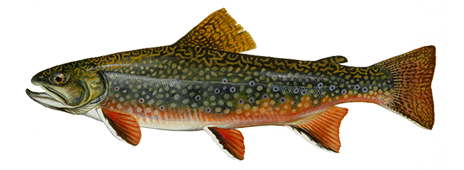Brook Trout

The brook trout is one of the most popular game fishes in northeastern North America.
HOW TO IDENTIFY A BROOK TROUT
It is a typical char of the Salvelinus genus. The lower fins (pectoral, pelvic and anal) of chars have a milk-white leading edge, distinguishing them from trouts. It is often identified by the light green to cream-colored wavy lines (vermiculations) on the back and top of the head, and by the pale yellowish or greenish spots and the red spots with blue halos (ocelli) on the sides. The dorsal fin has heavy black vermiculations. The basic color of the back is olive-green to dark brown, lightening to white on the belly. At spawning time, the lower flanks and the belly of the males turn bright orange-red with a black edge on the lower sides. Sea-run specimens turn silvery, often with a light iridescent purplish sheen, and with only the red spots showing. The tail is squarish or only very slightly indented. All the fins are soft rayed, without spines
WHERE TO CATCH BROOK TROUT
The brook trout is native to northeastern North America, primarily from the Great Lakes north to the Hudson Bay and east to the Atlantic and Arctic coasts. It occurs in the Appalachians southeast of the Great Lakes to the northeastern corner of Georgia. It inhabits clear, cold mountain streams and lakes, preferring water temperatures of approximately 57-61 degrees Fahrenheit (13-16 degrees Celsius). It is rarely found in waters exceeding 68 degrees Fahrenheit (20 degrees Celsius), and temperatures of 77-80 degrees Fahrenheit (25-27 degrees Celsius) are fatal. It has been introduced into areas of high elevation throughout most of western North America. Today it can be found in scattered locations from the central portions of the lower Canadian Provinces south almost to Mexico (west of Texas). It has also been introduced to other continents, notably South America (Argentina), and Europe. The following list includes additional details on where to catch this fish
Outside of Bends Overhanging Trees and bushes
Riparian Zones Rivers and streams
Rock and boulder pocket Dams and Falls
Drop-Off Eddies
Merging Currents Small Pointed Waves
Standing Waves Undercuts
Current Edges
HOW TO CATCH BROOK TROUT
It is one of the most popular game fishes in northeastern North America, actively sought by both fly fishing and spinning enthusiasts. The following are fishing methods used to catch this fish
Fly Fish Bait Fish
Still Fishing Spin Casting
BROOK TROUT LURES, TACKLE & BAIT
The following are lures, tackle or bait that can be used to catch this fish:
Curd Fish Roe Flies Insects
Jigs Spoons